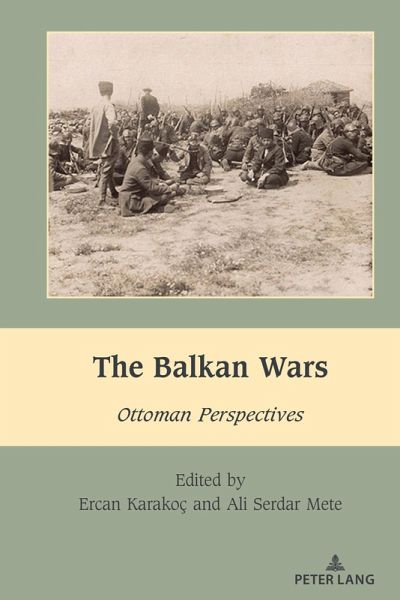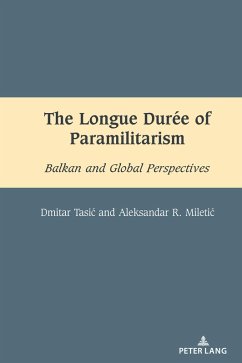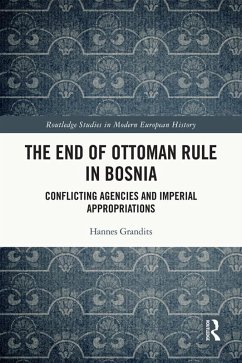
The Balkan Wars (eBook, PDF)
Ottoman Perspectives
Versandkostenfrei!
Sofort per Download lieferbar
Statt: 84,95 €**
69,95 €
inkl. MwSt.
**Preis der gedruckten Ausgabe (Gebundenes Buch)
Alle Infos zum eBook verschenkenWeitere Ausgaben:

PAYBACK Punkte
35 °P sammeln!
Described as the "sick man of Europe" by the Great Powers, the Ottoman Empire in the early twentieth century was in terminal decline. The newly independent Balkan states-Greece, Serbia, Montenegro and Bulgaria-each had significant ethnic populations who had remained under Ottoman rule. Under the guidance of Russia, which had its own interests in south-east Europe, they joined forces against the Ottomans, under the name of the Balkan League, in 1912.In the first phase of the Balkan Wars, Bulgarian, Greek, Montenegrin and Serbian armies fought together against the Ottoman Empire, dealing the Ott...
Described as the "sick man of Europe" by the Great Powers, the Ottoman Empire in the early twentieth century was in terminal decline. The newly independent Balkan states-Greece, Serbia, Montenegro and Bulgaria-each had significant ethnic populations who had remained under Ottoman rule. Under the guidance of Russia, which had its own interests in south-east Europe, they joined forces against the Ottomans, under the name of the Balkan League, in 1912.
In the first phase of the Balkan Wars, Bulgarian, Greek, Montenegrin and Serbian armies fought together against the Ottoman Empire, dealing the Ottomans a heavy defeat in a result that made headlines around the world. In the second phase, the Balkan states fought each other, and Romania also entered the war. In the conflict's aftermath, new borders failed to satisfy any of the belligerent parties. Interventions by the Great Powers further increased tensions in the region. As the ultimate result, the first bullet that triggered the First World War was fired in Sarajevo in June 1914.
The causes and effects of the Balkan Wars have remained controversial despite the passage of time. In this volume, writers from various Balkan nations and from across various disciplines have come together under the aegis of the Balkan History Association to address little-known and little-studied aspects of the wars. Collectively they analyze a huge range of political, historical, medical, sociological and religious aspects of the conflict. The book, with its ground-breaking content and unique bibliographies, will be an important guide for undergraduate and graduate students studying the political, military and social history of the Balkan Wars and the Balkan nations.
"The Balkan Wars of 1912/13 were a disaster for the Ottoman Empire, a triumph for the Balkan governments, and a tragedy for the population of the belligerent states.This well structured collection brings together contributors from various backgrounds. Together they help to understand overarching issues far beyond the military event, and especially the still underresearched Ottoman perspective."
-Katrin Boeckh, LMU Munich/IOS Regensburg
In the first phase of the Balkan Wars, Bulgarian, Greek, Montenegrin and Serbian armies fought together against the Ottoman Empire, dealing the Ottomans a heavy defeat in a result that made headlines around the world. In the second phase, the Balkan states fought each other, and Romania also entered the war. In the conflict's aftermath, new borders failed to satisfy any of the belligerent parties. Interventions by the Great Powers further increased tensions in the region. As the ultimate result, the first bullet that triggered the First World War was fired in Sarajevo in June 1914.
The causes and effects of the Balkan Wars have remained controversial despite the passage of time. In this volume, writers from various Balkan nations and from across various disciplines have come together under the aegis of the Balkan History Association to address little-known and little-studied aspects of the wars. Collectively they analyze a huge range of political, historical, medical, sociological and religious aspects of the conflict. The book, with its ground-breaking content and unique bibliographies, will be an important guide for undergraduate and graduate students studying the political, military and social history of the Balkan Wars and the Balkan nations.
"The Balkan Wars of 1912/13 were a disaster for the Ottoman Empire, a triumph for the Balkan governments, and a tragedy for the population of the belligerent states.This well structured collection brings together contributors from various backgrounds. Together they help to understand overarching issues far beyond the military event, and especially the still underresearched Ottoman perspective."
-Katrin Boeckh, LMU Munich/IOS Regensburg
Dieser Download kann aus rechtlichen Gründen nur mit Rechnungsadresse in A, D ausgeliefert werden.













